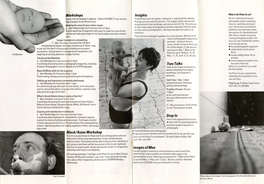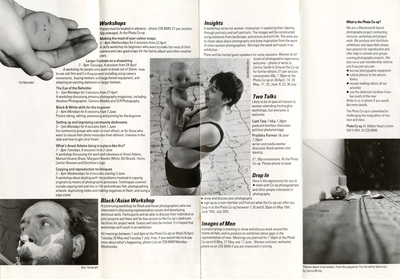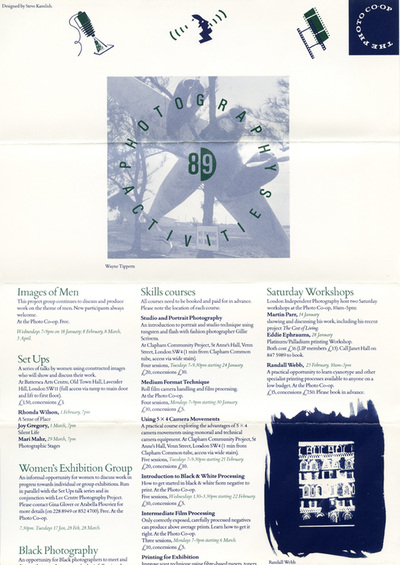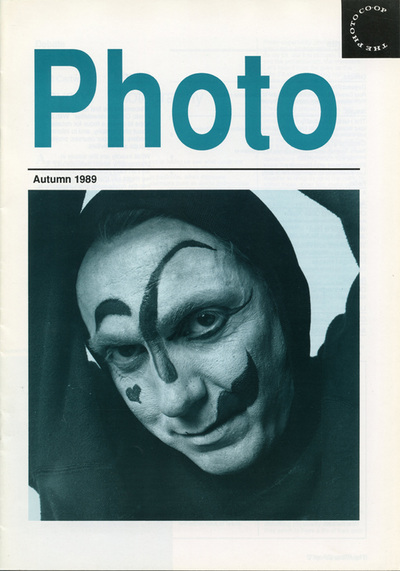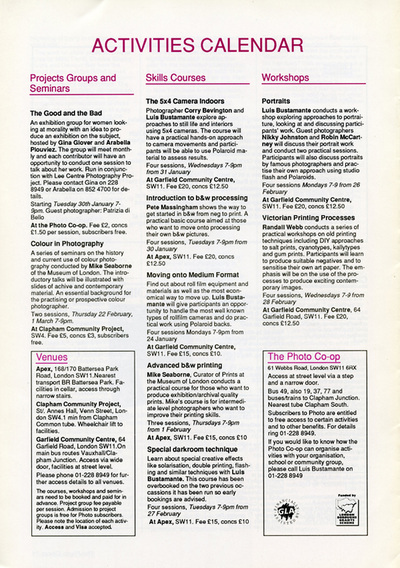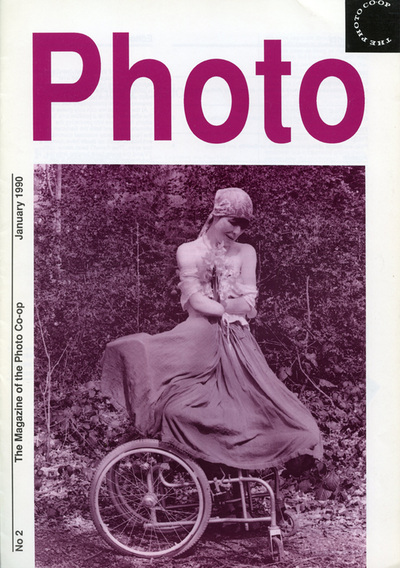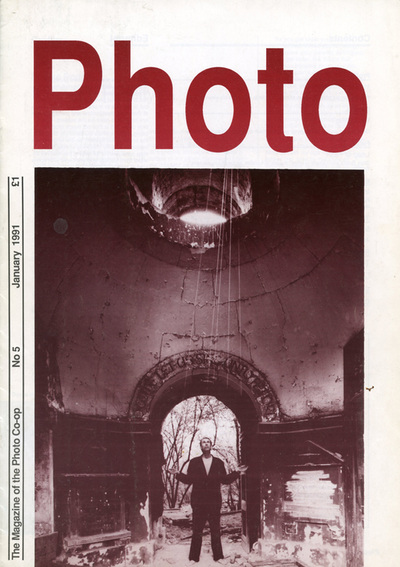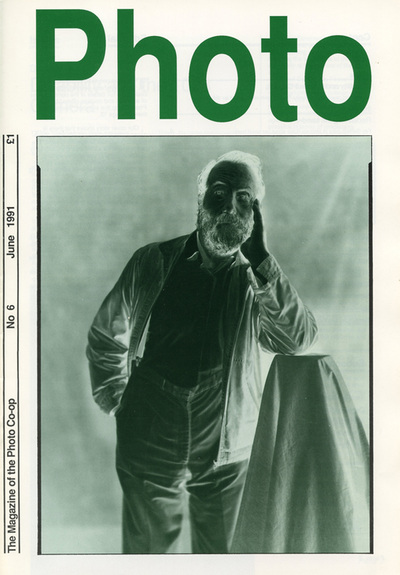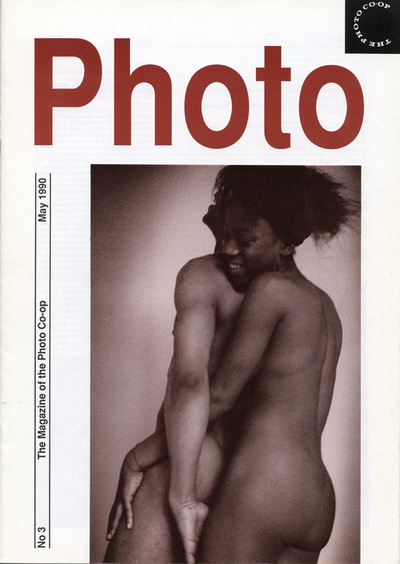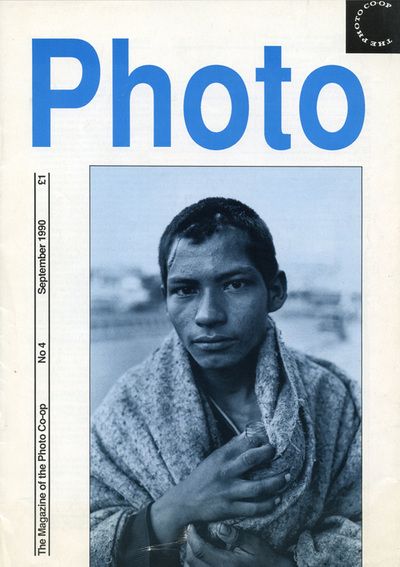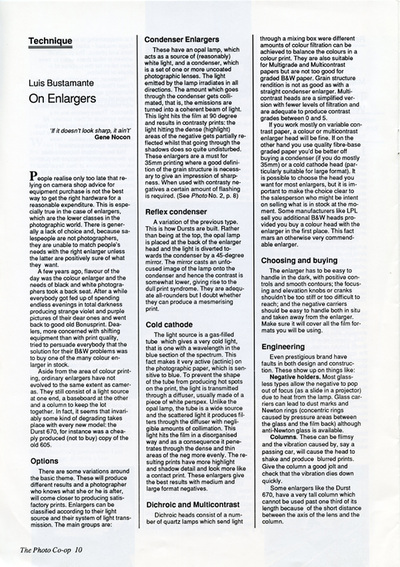|
Interview with Luis Bustamente
Education Organiser When did you join the Photo Co-op? Why? And what was your role? I worked at the Photo Co-Op from c1985 to c1991. I worked as the Education Organiser. I think the outfit took a big risk in appointing me as I was very much an unknown quantity, having worked in the cosy environment of academia in my previous employment. The main thing I remember from my job interview was that I had to travel from Bristol with my 18 month old daughter Sarah in the back of the car, as my wife had gone to Geneva for a conference. The interview ended with me having to change her nappy in the middle of the office. I think it was a bit impulsive to apply for this job as I was an alien in more than one way. I had come as a political refugee in 1974, lived and worked in the North of England and then in Bristol having no experience at all of London. I learned the hard way that the job involved a lot of local knowledge. What was the first major project you worked on? Putting together the Photo Co-op educational programme was an exhilarating experience. Our approach included a wide range of skills, from the purely technical to conceptual approaches. Our constituency was made of people who had an interest in photography, from absolute beginners to practicing visual artists. I was a single trick pony and my contribution was mostly to bring a sense of enthusiasm for the medium. Gradually the activities programme developed an identity of its own. At the time we were operating from an office which was actually the front room of a small terrace house and finding venues for the different courses and activities was always a challenge and the job involved a lot of moving about in South London and meeting some really interesting people. Once I went to North London to talk to Jo Spence and I managed to lock the company car (a battered VW Polo) with the keys inside. We had to ring the police, who turned up with a female car burglar who managed to open the door in seconds. What were some of the most important projects you worked on to you? Outreach was a major part of my job description and the biggest challenge. Still, I became a governor of the local school, liaised with a couple of colleges and community / photography organisations with whom we ran some courses. Also, we gradually became a focus point for a substantial group of local artists, free-lancers, activists who would revolve around the Co-op on a regular basis. One of my more successful contributions was the launching of a magazine called Photo, using only the publicity budget. With this we killed 2 birds with 1 stone. The magazine provided a platform for members and users to contribute to the debate on photography while publicising the activities. It ran between 1989 and 1991. I still regret that we didn’t manage to continue with it as there was a space for publications that would enable aspiring artists / theorists to put ideas in the public domain at a time when debates around representation were at a much more meaningful level than today. What was special about the Photo Co-op for you? What did the Co-op mean to you? I’d always fancied myself a photographer even if I didn’t have formal training (my academic background was in languages and lit) nor a visible track record. However, I’d managed to put together a body of work which was relevant for me to get the job at the Photo Co-op. I had decided to stop working in universities and I’d moved into community arts. Hence, working at the Photo Co-op consolidated my move into the photography sector. There, I learned a lot from my fellow directors who were mostly practising photographers who operated in a particular niche. They were all politically aware and weren’t strictly doing it for the money, but more as a labour of love. In this I felt very much in tune with the organisation. The way we operated was also very inspiring. We would have a board meeting every Monday morning and ongoing work was planned and reviewed. It’s difficult to see a more transparent and efficient way of doing things. At the same time, I felt we were having an effect, through the activites and courses, on the politics of the time. Also, we did things together, even outside work that were immensely useful. Once Crispin organised to go and see Aliens as a group and this turned into a great opportunity to discuss topical issues. Do you remember what was happening in society at the time? This was still Thatcher’s Britain but it was not yet very visible the magnitude of the changes that we were undergoing. The neoliberal project was still in its infancy and despite the deep effect Thatcherism had on society, the catastrophic effect of neoliberal economics hadn’t yet impacted he social fabric of the country. Coming from Chile, the testing ground of neoliberalism, I felt I had a mission to prevent these policies to damage what I saw as a benign, humane society that had provided me and many others with a heaven from brutality and oppression. These were the days of the GLC and there was an atmosphere of optimism and good will in London. When you compare with the present day, there was an openness where people were trying to have a say in the ongoing debates. This endeavour left a deep mark in the attitudes to race, gender and politics in general. Who do you consider the most influential people in the Co-op? What made the Photo Co-op a great outfit was the sum of its members. At the time we were all learning on the job and it was difficult to single out individual leaders. We could say that there was strength in numbers. Being in an outfit that was driven by a liberating vision was fulfilling. However, Chris Boot had his finger on the pulse of the sector and was able to point at trends and developments which were relevant to us as a group. Personally I learned a great deal from Chris about the British way of doing things and bridge the abysmal cultural gap that existed between myself and British society. It was very challenging at the time but the learning during that period was life changing. What are you up to now? I got into formal education after leaving the Photo Co-op. Went to work at City of Bristol as a photographic technician, then as a lecturer and finally as the first Co-ordinator of the Foundation in Art Photography programme. I retired at 67 and went into expanding my own body of work. I have now self-funded and produced a number of Blurb Photobooks. |
'These were the days of the GLC and there was an atmosphere of optimism and good will in London. There was an openness where people were trying to have a say in the ongoing debates. This endeavour left a deep mark in the attitudes to race, gender and politics in general.'
Luis Bustamente Education Organiser |

